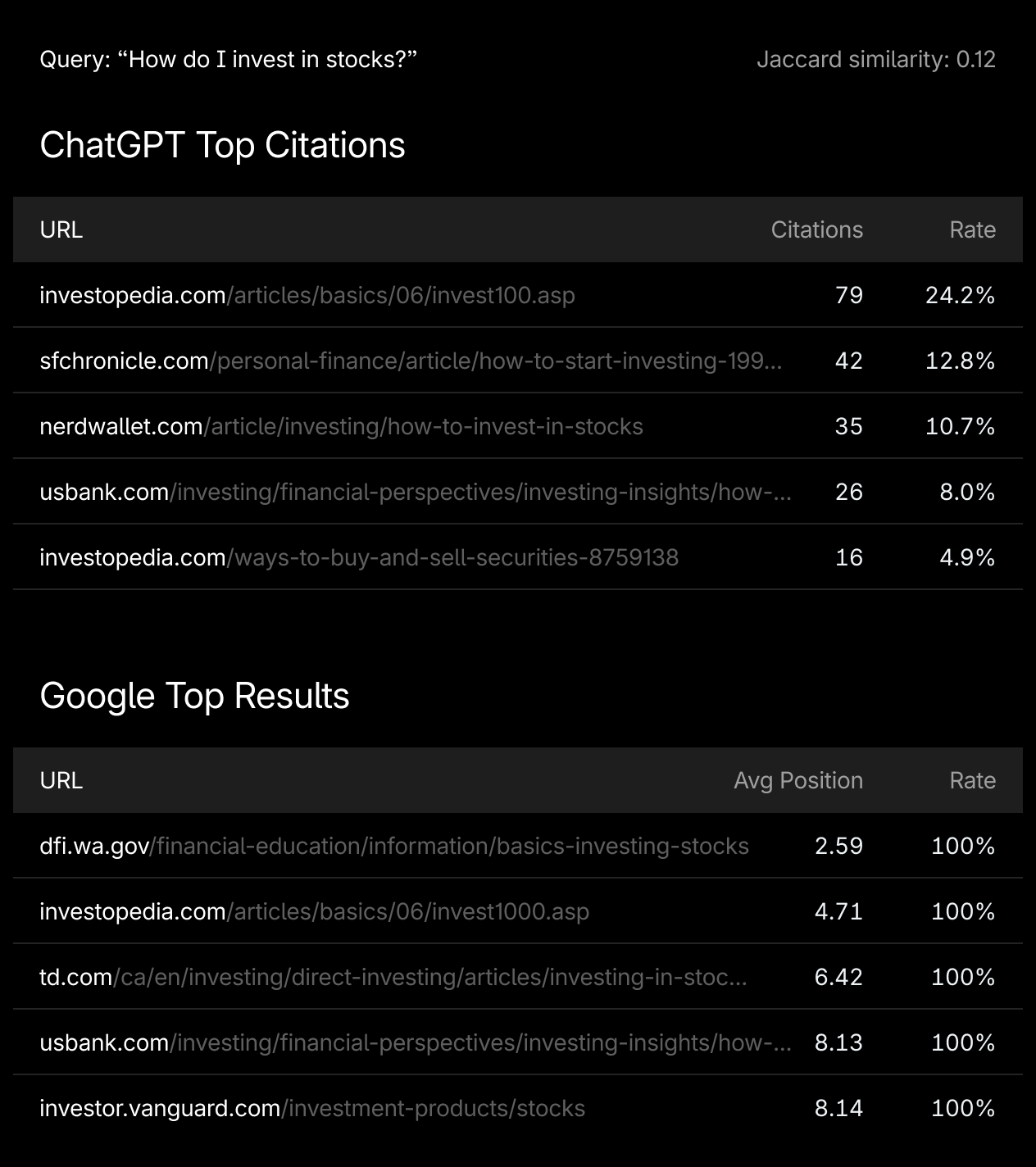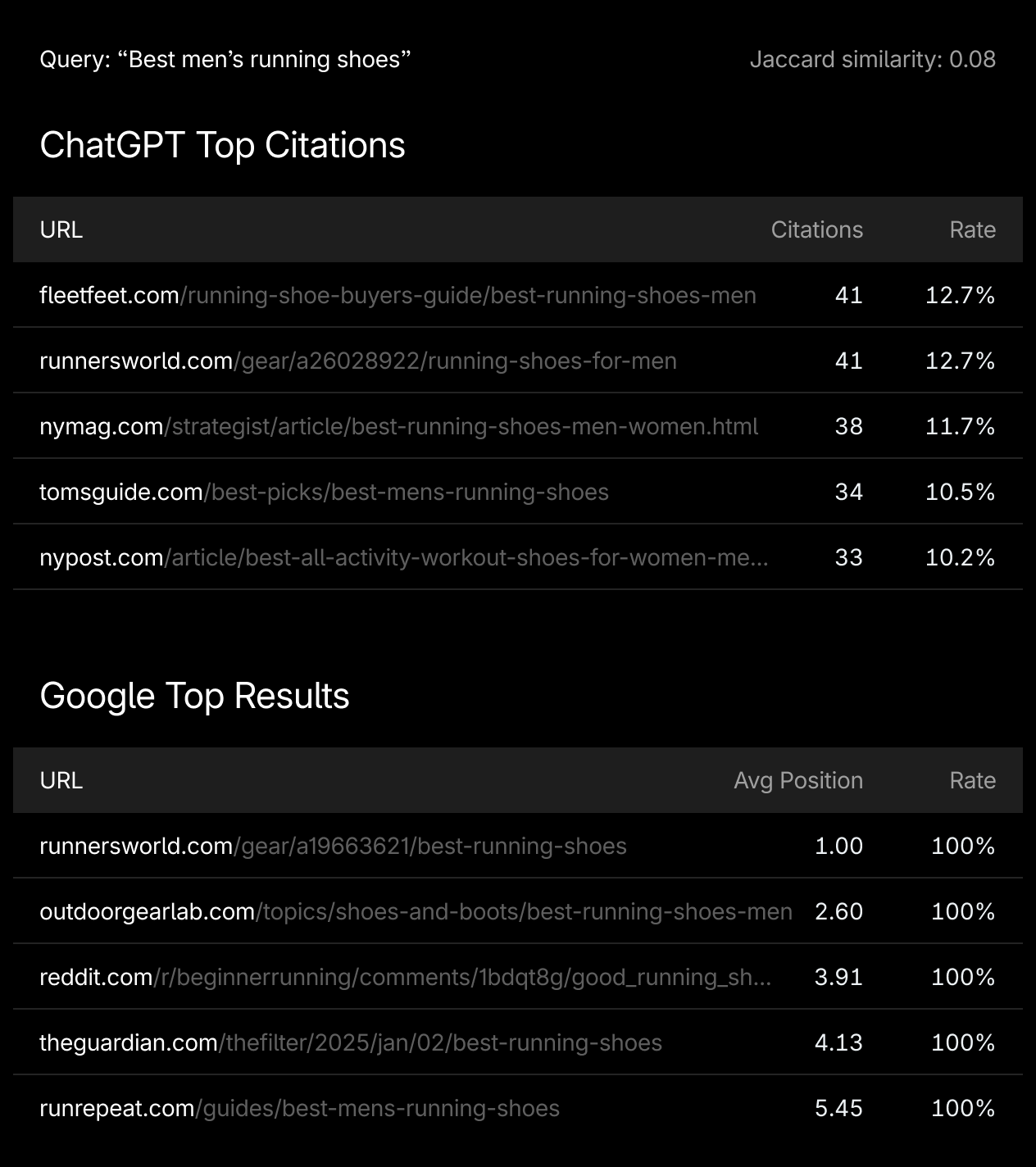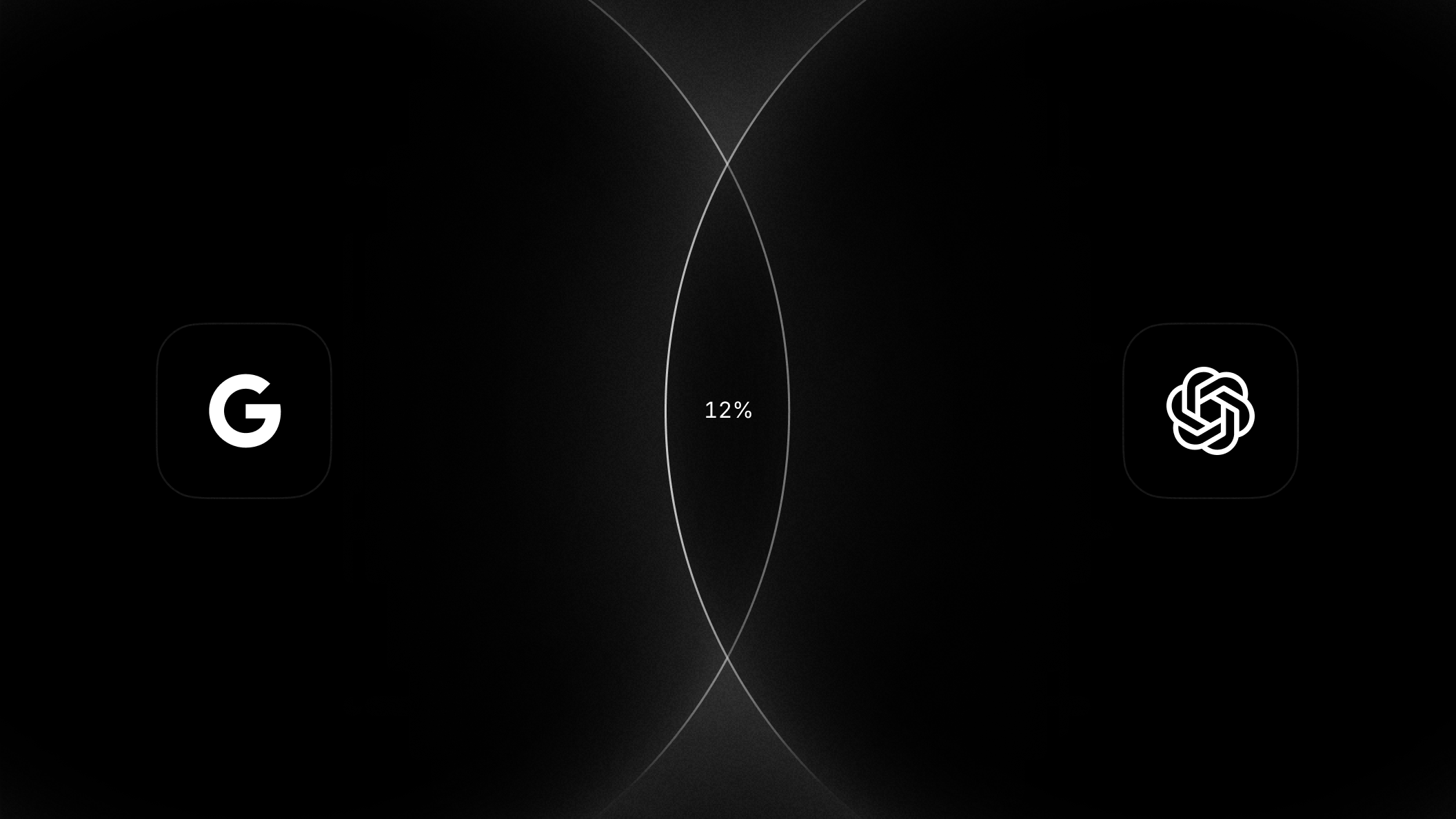Introduction
If you think ChatGPT simply mirrors Google, think again. Here at Profound, we conducted research which shows that ChatGPT's top‐cited sites rarely overlap with Google's top results. This is crucial for brands. Over 400 million people now use ChatGPT weekly, and 60–70% of its answers rely on some form of web retrieval. That means your content needs to shine in both Google's SERP and in ChatGPT's retrieval algorithms, or you risk missing a huge slice of potential traffic.
We tested two queries:
- "How do I invest in stocks?" (asked 324 times on ChatGPT)
- "Best men's running shoes?" (asked 327 times on ChatGPT)
We then compared these ChatGPT results with 200 total Google SERP pulls (100 per query). The overlaps and correlations were startlingly low and sometimes even inverted.

Download the full report
Free formatted spreadsheet with all of the raw insights.
Method at a Glance
-
Queries: We ran each query hundreds of times on ChatGPT (324 for stocks, 327 for running shoes) to gather a robust sample of cited URLs. For Google, we captured 100 unique search results per query across unique sessions in incognito mode.
-
Data Collected:
- ChatGPT: Which URLs were cited, how often, and in what context.
- Google: Which URLs showed up in the top 20 organic positions, plus their rank.
-
Key Metrics:
- Overlap: What percentage of URLs appear in both systems?
- Coverage: Of the URLs ChatGPT references, how many does Google rank, and vice versa?
- Correlation: Does a high rank on Google translate into frequent ChatGPT citations?
Given that hundreds of millions of people are already tapping ChatGPT weekly, and the model increasingly pulls from real‐time web data, this question has immediate, real‐world implications for marketers and SEO teams.
High‐Level Findings
-
"How do I invest in stocks?"
- Overlap: ~12% of URLs were shared between ChatGPT's citation set and Google's SERP results.
- Moderate Correlation (r ≈ 0.41): Some sites like Investopedia or NerdWallet do appear on both platforms, but the correlation isn't strong enough to guarantee consistent ranking across channels.

Takeaway: Google sees sites like E*TRADE and official government pages at the top, while ChatGPT leans more on editorial "how‐to" guides or detailed explainer pieces.
-
"Best men's running shoes?"
- Overlap: Only ~8% of URLs matched between ChatGPT and Google.
- Negative Correlation (r ≈ –0.98): A shocking –0.98 correlation, meaning the more ChatGPT liked a URL, the less likely Google was to rank it.

Takeaway: Google often highlights brand pages and direct purchase links, while ChatGPT cites editorial deep‐dives or "Top 10" reviews from specialized running sites. They're almost polar opposites here.
What the Data Tells Us
-
Two Separate "Search Engines"
Overlaps of 8–12% are extremely low, confirming that ChatGPT effectively runs on different signals than Google. If you dominate Google, don't assume ChatGPT will follow suit. -
Commercial Queries Lead to Completely Different Search Results
Queries about what to buy, what product is best etc. are drastically different in ChatGPT compared to the traditional Google SERP. This means for brands looking to market in ChatGPT, being mentioned in Google/having a top-ranked product means nothing to ChatGPT. -
AI Retrieval ≠ Traditional Ranking
ChatGPT's usage of editorial or reference‐style content explains why certain deep‐dive pieces appear frequently even if they barely rank in Google. For the running shoes query, the negative correlation suggests Google's "brand first" approach stands in sharp contrast to ChatGPT's preference for extended reviews. -
Stakes Are High and Growing
With 400M weekly users and a 60–70% web retrieval rate, ChatGPT isn't a niche platform. Failing to optimize for it means losing visibility where a significant portion of internet traffic is seeking answers.
Why This Matters
- Users Are Bypassing Google: Many people now treat ChatGPT as their first stop for advice or product research. If your content doesn't show up in ChatGPT's citations, you're absent from this emerging funnel.
- Your "#1 Google Result" Is Irrelevant Elsewhere: We see brand or e‐commerce pages that rank well on Google but never surface in ChatGPT.
- Opportunity for Newcomers: ChatGPT's emphasis on editorial and thorough explanations means smaller sites, with well-structured, in‐depth content, can outshine bigger names.
What You Should Do
- Aim for "Citable" Content
- ChatGPT draws on text it can easily summarize or quote. Provide concise definitions, bullet points, or well-labeled sections that a language model can incorporate into an answer.
- Give Context, Not Just Keywords
- Traditional SEO aims for certain keyword densities. AI retrieval, however, prioritizes context and clarity. Detailed explanations, comparisons, or how‐to guides can win the day.
- Create an "AI‐Ready" Infrastructure
- Consider a machine-readable map (e.g., llms.txt) or easily scraped sections that outline your site's key content. This helps retrieval-based AI find exactly what it needs in fewer steps. Agent Experience (AX) could be a key to success.
- Monitor Your AI Visibility
- Profound is the world’s best AI visibility monitoring platform.
Discover the New Frontier of AI Search
My analysis of over 650 ChatGPT queries and 200 Google SERP queries proves definitively that AI search and traditional SEO content prioritization and ranking factors are completely different. With more than 400 million weekly ChatGPT users actively discovering products and brands through AI, it’s clear that Answer Engine Optimization (AEO) is the next big channel, one you simply can’t afford to ignore.
Act Now
AI is reshaping how consumers discover brands, just like social media and mobile did. Don’t let your brand be left behind. Whether you’re a forward-thinking enterprise or a dynamic agency, Profound gives you the tools to ensure your brand is seen, heard, and remembered in the AI era.
